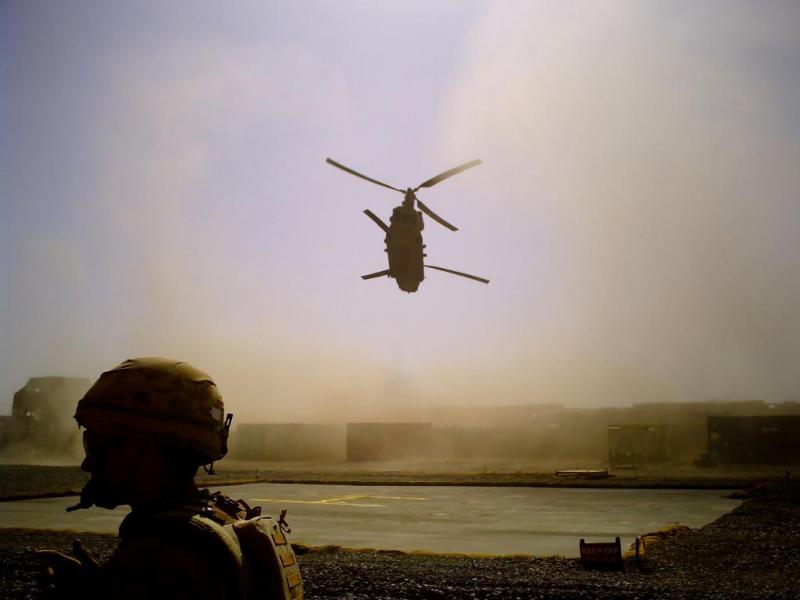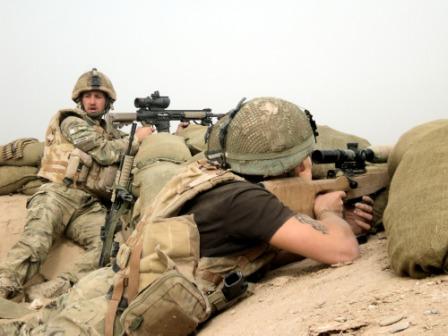Our War: Into the Hornet's Nest, BBC Three | reviews, news & interviews
Our War: Into the Hornet's Nest, BBC Three
Our War: Into the Hornet's Nest, BBC Three
Moving, memorable documentary follows the Arnhem Company as they pick a fight against the Taliban

It is a Hollywood truism that any film that begins with amateur footage of happy, smiling people ends in tears. Our War was no exception: fit young men messed about in the sun and somersaulted into the Med. However, their R&R was soon over and our boys were back in Afghanistan. As one member of Arnhem Company, 2nd battalion Duke of Lancaster’s Regiment, so articulately put it: “I wouldn’t come here on fucking holiday.”
The company’s nickname is the Lions of England – which immediately brings to mind the First World War phrase “lions led by donkeys”. This turned out to be ominously true. Its mission was to “pick a fight” with the Taliban in Helmand so that a vital road link could be completed without interference. The fact that the operation was dubbed “Kick the Hornets’ Nest” suggested the top brass knew they were asking for trouble and, by Jiminy, they got it. The daring and persistence of the insurgents had been seriously underestimated. Jokes about boredom soon sounded hollow as grenades came raining down from a mere 10 metres away.
The British army is still an institution in which the accents get posher the higher you go
It was, in the words of one participant, “a little bit more kinetic than we expected”. “Kinetic” is doublespeak for hectic, frantic and chaotic. The sense of bloody flux was augmented by the superbly edited footage from helmet-cams and mobile phones. Kingsman Darren Deady was shot and another almost squashed when a Chinook helicopter, sent to medevac Darren back to Camp Bastion, nearly landed on him. After three days in August 2010 the men were hungry, exhausted and dehydrated but they were not immediately pulled back. A wrong turn at night took them into the dreaded “Padaka Horseshoe” – a U-shaped minefield. However, it was only when they had taken shelter in a deserted compound that their “boss” on the ground, Captain Andrew Griffiths, stepped on an Improvised Explosive Device. Andrew was also successfully evacuated and, along with Darren, flown back to hospital in England where they lay side by side. Both men died.
 The final scene in which Andrew’s father, Brigadier Mike Griffiths – who just happened to be colonel of his regiment – fought to hold back the tears while attempting to justify the Allied cause in Afghanistan was deeply distressing. What he didn’t say was more eloquent than what he did. Similarly, the still photographs of the battle-weary men were more powerful than the moving footage. Just because the first series of Our War won a Bafta award should not preclude it from winning another.
The final scene in which Andrew’s father, Brigadier Mike Griffiths – who just happened to be colonel of his regiment – fought to hold back the tears while attempting to justify the Allied cause in Afghanistan was deeply distressing. What he didn’t say was more eloquent than what he did. Similarly, the still photographs of the battle-weary men were more powerful than the moving footage. Just because the first series of Our War won a Bafta award should not preclude it from winning another.
Even if you believe that British troops should never have been sent on what has proved to be a fool’s errand, there is no denying the bravery of these self-confessed scallies from Liverpool and Manchester. The camaraderie – their unashamed love for each other and their country – shone through and made their losses all the harder to bear. The British army is still an institution in which the accents get posher the higher you go. Donkeys bray but lions roar.
It is little consolation that most of these men actually enjoy what they do: “This, ladies and gentlemen, is fucking war!” The documentary acknowledged the adrenalin rush experienced as shoulder-mounted rocket-launchers shoot near-certain death to the enemy – indeed the viewer shared in it – but the moment passed to leave, at least in this one, a sense of bitter futility. Let’s hope Tony Blair caught it.
Explore topics
Share this article
Add comment
The future of Arts Journalism
You can stop theartsdesk.com closing!
We urgently need financing to survive. Our fundraising drive has thus far raised £49,000 but we need to reach £100,000 or we will be forced to close. Please contribute here: https://gofund.me/c3f6033d
And if you can forward this information to anyone who might assist, we’d be grateful.

Subscribe to theartsdesk.com
Thank you for continuing to read our work on theartsdesk.com. For unlimited access to every article in its entirety, including our archive of more than 15,000 pieces, we're asking for £5 per month or £40 per year. We feel it's a very good deal, and hope you do too.
To take a subscription now simply click here.
And if you're looking for that extra gift for a friend or family member, why not treat them to a theartsdesk.com gift subscription?
more TV
 Murder Before Evensong, Acorn TV review - death comes to the picturesque village of Champton
The Rev Richard Coles's sleuthing cleric hits the screen
Murder Before Evensong, Acorn TV review - death comes to the picturesque village of Champton
The Rev Richard Coles's sleuthing cleric hits the screen
 Black Rabbit, Netflix review - grime and punishment in New York City
Jude Law and Jason Bateman tread the thin line between love and hate
Black Rabbit, Netflix review - grime and punishment in New York City
Jude Law and Jason Bateman tread the thin line between love and hate
 The Hack, ITV review - plodding anatomy of twin UK scandals
Jack Thorne's skill can't disguise the bagginess of his double-headed material
The Hack, ITV review - plodding anatomy of twin UK scandals
Jack Thorne's skill can't disguise the bagginess of his double-headed material
 Slow Horses, Series 5, Apple TV+ review - terror, trauma and impeccable comic timing
Jackson Lamb's band of MI5 misfits continues to fascinate and amuse
Slow Horses, Series 5, Apple TV+ review - terror, trauma and impeccable comic timing
Jackson Lamb's band of MI5 misfits continues to fascinate and amuse
 Coldwater, ITV1 review - horror and black comedy in the Highlands
Superb cast lights up David Ireland's cunning thriller
Coldwater, ITV1 review - horror and black comedy in the Highlands
Superb cast lights up David Ireland's cunning thriller
 Blu-ray: The Sweeney - Series One
Influential and entertaining 1970s police drama, handsomely restored
Blu-ray: The Sweeney - Series One
Influential and entertaining 1970s police drama, handsomely restored
 I Fought the Law, ITVX review - how an 800-year-old law was challenged and changed
Sheridan Smith's raw performance dominates ITV's new docudrama about injustice
I Fought the Law, ITVX review - how an 800-year-old law was challenged and changed
Sheridan Smith's raw performance dominates ITV's new docudrama about injustice
 The Paper, Sky Max review - a spinoff of the US Office worth waiting 20 years for
Perfectly judged recycling of the original's key elements, with a star turn at its heart
The Paper, Sky Max review - a spinoff of the US Office worth waiting 20 years for
Perfectly judged recycling of the original's key elements, with a star turn at its heart
 The Guest, BBC One review - be careful what you wish for
A terrific Eve Myles stars in addictive Welsh mystery
The Guest, BBC One review - be careful what you wish for
A terrific Eve Myles stars in addictive Welsh mystery
 theartsdesk Q&A: Suranne Jones on 'Hostage', power pants and politics
The star and producer talks about taking on the role of Prime Minister, wearing high heels and living in the public eye
theartsdesk Q&A: Suranne Jones on 'Hostage', power pants and politics
The star and producer talks about taking on the role of Prime Minister, wearing high heels and living in the public eye
 King & Conqueror, BBC One review - not many kicks in 1066
Turgid medieval drama leaves viewers in the dark
King & Conqueror, BBC One review - not many kicks in 1066
Turgid medieval drama leaves viewers in the dark
 Hostage, Netflix review - entente not-too-cordiale
Suranne Jones and Julie Delpy cross swords in confused political drama
Hostage, Netflix review - entente not-too-cordiale
Suranne Jones and Julie Delpy cross swords in confused political drama

Comments
Excellent article about an